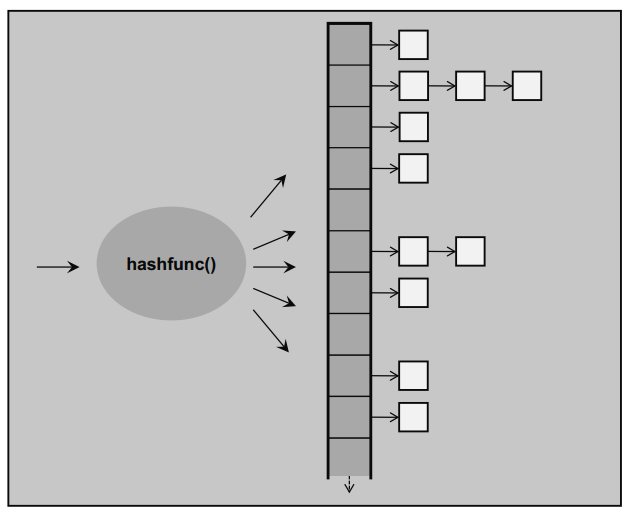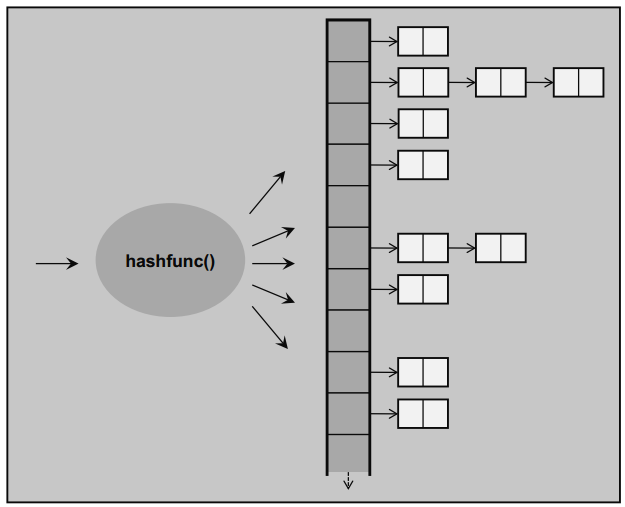STL Unordered Container
Unordered Container



包含头文件<unordered_set>或<unordered_map>。
定义:
1 | namespace std { |
unordered set或multiset的元素必须是可比较的。
unordered map或multimap的key和value都必须copyable或movable。key必须在指定相等比较标准下可比较。
内置的hash<>支持所有内置类型,特殊的类型需要提供自己的hash function。性能就取决于hash function的质量。
Unordered Container。内部用hash table实现。
前向迭代器。key是const的,只能删除再添加,不能修改。erase操作不会让迭代器失效。insert/rehash/reverse/clear会导致rehash,从而让迭代器失效。
Unordered容器的操作
Create, Copy, and Destroy
| Operation | Effect |
|---|---|
| Unord c | Default constructor; creates an empty unordered container without any elements |
| Unord c(bnum) | Creates an empty unordered container that internally uses at least bnum buckets |
| Unord c(bnum, hf) | Creates an empty unordered container that internally uses at least bnum buckets and hfas hash function |
| Unord c(bnum, hf, cmp) | Creates an empty unordered container that internally uses at least bnum buckets, hfas hash function, and cmp as predicate to identify equal values |
| Unord c(c2) | Copy constructor; creates a copy of another unordered container of the same type (all elements are copied) |
| Unord c = c2 | Copy constructor; creates a copy of another unordered container of the same type (all elements are copied) |
| Unord c(rv) | Move constructor; creates an unordered container, taking the contents of the rvalue rv (since C++11) |
| Unord c = rv | Move constructor; creates an unordered container, taking the contents of the rvalue rv (since C++11) |
| Unord c(beg, end) | Creates an unordered container initialized by the elements of the range [beg,end) |
| Unord c(beg, end, bnum) | Creates an unordered container initialized by the elements of the range [beg,end) that internally uses at least bnum buckets |
| Unord c(beg, end, bnum, hf) | Creates an unordered container initialized by the elements of the range [beg,end) that internally uses at least bnum buckets and hfas hash function |
| Unord c(beg, end, bnum, hf, cmp) | Creates an unordered container initialized by the elements of the range [beg,end) that internally uses at least bnum buckets, hfas hash function, and cmp as predicate to identify equal values |
| Unord c(initlist) | Creates an unordered unordered container initialized by the elements of the initializer list initlist |
| Unord c = initlist | Creates an unordered unordered container initialized by the elements of the initializer list initlist |
| c.~Unord() | Destroys all elements and frees the memory |
其中Unord可以是:
| Unord | Effect |
|---|---|
unordered_set<Elem> |
An unordered set that by default hashes with hash<> and compares equal_to<> (operator ==) |
unordered_set<Elem, Hash> |
An unordered set that by default hashes with Hash and compares equal_to<> (operator ==) |
unordered_set<Elem, Hash, Cmp> |
An unordered set that by default hashes with Hash and compares with Cmp |
unordered_multiset<Elem> |
An unordered multiset that by default hashes with hash<> and compares equal_to<> (operator ==) |
unordered_multiset<Elem, Hash> |
An unordered multiset that by default hashes with Hash and compares equal_to<> (operator ==) |
unordered_multiset<Elem, Hash, Cmp> |
An unordered multiset that by default hashes with Hash and compares with Cmp |
unordered_map<Key, T> |
An unordered map that by default hashes with hash<> and compares equal_to<> (operator ==) |
unordered_map<Key, T, Hash> |
An unordered map that by default hashes with Hash and compares equal_to<> (operator ==) |
unordered_map<Key, T, Hash, Cmp> |
An unordered map that by default hashes with Hash and compares with Cmp |
unordered_multimap<Key, T> |
An unordered multimap that by default hashes with hash<> and compares equal_to<> (operator ==) |
unordered_multimap<Key, T, Hash> |
An unordered multimap that by default hashes with Hash and compares equal_to<> (operator ==) |
unordered_multimap<Key, T, Hash, Cmp> |
An unordered multimap that by default hashes with Hash and compares with Cmp |
Layout Operations
| Operation | Effect |
|---|---|
| c.hash_function() | Returns the hash function |
| c.key_eq() | Returns the equivalence predicate |
| c.bucket_count() | Returns the current number of buckets |
| c.max_bucket_count() | Returns the maximum number of buckets possible |
| c.load_factor() | Returns the current load factor |
| c.max_load_factor() | Returns the current maximum load factor |
| c.max_load_factor(val) | Sets the maximum load factor to val |
| c.rehash(bnum) | Rehashes the container so that it has a bucket size of at least bnum |
| c.reserve(num) | Rehashes the container so that is has space for at least num elements (since C++11) |
影响内部布局的操作。
rehash与reserve的比较:
1 | coll.rehash(100); //prepare for 100/max_load_factor() elements |
Nonmodifying Operations
| Operation | Effect |
|---|---|
| c.empty() | Returns whether the container is empty (equivalent to size()==0 but might be faster) |
| c.size() | Returns the current number of elements |
| c.max_size() | Returns the maximum number of elements possible |
| c1 == c2 | Returns whether c1 is equal to c2 |
| c1 != c2 | Returns whether c1 is not equal to c2 (equivalent to !(c1==c2) ) |
Special Search Operations
| Operation | Effect |
|---|---|
| c.count(val) | Returns the number of elements with value val |
| c.find(val) | Returns the position of the first element with value val (or end() if none found) |
| c.equal_range(val) | Returns a range with all elements with a value equal to val (i.e., the first and last positions, where val would get inserted) |
Assignments
| Operation | Effect |
|---|---|
| c = c2 | Assigns all elements of c2 to c |
| c = rv | Move assigns all elements of the rvalue rv to c (since C++11) |
| c = initlist | Assigns all elements of the initializer list initlist to c (since C++11) |
| c1.swap(c2) | Swaps the data of c1 and c2 |
| swap(c1, c2) | Swaps the data of c1 and c2 |
Iterator Operations
| Operation | Effect |
|---|---|
| c.begin() | Returns a forward iterator for the first element |
| c.end() | Returns a forward iterator for the position after the last element |
| c.cbegin() | Returns a constant forward iterator for the first element (since C++11) |
| c.cend() | Returns a constant forward iterator for the position after the last element (since C++11) |
| c.rbegin() | Returns a reverse iterator for the first element of a reverse iteration |
| c.rend() | Returns a reverse iterator for the position after the last element of a reverse iteration |
| c.crbegin() | Returns a constant reverse iterator for the first element of a reverse iteration (since C++11) |
| c.crend() | Returns a constant reverse iterator for the position after the last element of a reverse iteration (since C++11) |
前向迭代器。
Insert and Remove Operations
| Operation | Effect |
|---|---|
| c.insert(val) | Inserts a copy of val and returns the position of the new element and, for unordered containers, whether it succeeded |
| c.insert(pos, val) | Inserts a copy of val and returns the position of the new element (pos is used as a hint pointing to where the insert should start the search) |
| c.insert(beg, end) | Inserts a copy of all elements of the range [beg,end) (returns nothing) |
| c.insert(initlist) | Inserts a copy of all elements in the initializer list initlist (returns nothing; since C++11) |
| c.emplace(args…) | Inserts a copy of an element initialized with args and returns the position of the new element and, for unordered containers, whether it succeeded (since C++11) |
| c.emplace_hint(pos, args…) | Inserts a copy of an element initialized with args and returns the position of the new element (pos is used as a hint pointing to where the insert should start the search) |
| c.erase(val) | Removes all elements equal to val and returns the number of removed elements |
| c.erase(pos) | Removes the element at iterator position pos and returns the following position (returned nothing before C++11) |
| c.erase(beg, end) | Removes all elements of the range [beg,end) and returns the following position (returned nothing before C++11) |
| c.clear() | Removes all elements (empties the container) |
Unordered Sets
1 | pair<iterator,bool> insert(const value_type& val); |
Unordered multisets
1 | iterator insert(const value_type& val); |
Direct Element Access of Unordered Maps
| Operation | Effect |
|---|---|
| c[key] | Inserts an element with key, if it does not yet exist, and returns a reference to the value of the element with key (only for nonconstant unordered maps) |
| c.at(key) | Returns a reference to the value of the element with key (since C++11) |
使用Unordered容器的示例
Unordered Set
1 |
|
Unordered Multiset
1 |
|
[1] The C++ Standard Library 2nd Edition